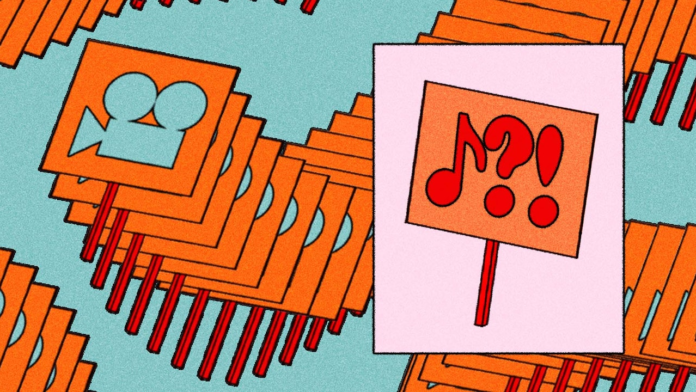There’s no artful needle drop to accompany the devastating moment described by Maggie Phillips. As a music supervisor with high-profile credits including Oscar winner Moonlight and Hulu’s The Dropout, Phillips typically has no shortage of work cooking, via her shop Deep Cut Music. But with roughly eight projects on hold since the spring, she’s lost as much as half of her income, and was recently forced to furlough her two employees. The decision came after months of compensating them out of her own savings; a planned 20 percent down payment on a house Phillips was about to buy in her Austin, Texas hometown has dwindled to 5 percent. “It’s fucking brutal,” Phillips says.
Phillips’ projects were all postponed due to the two work stoppages that have brought Hollywood productions to a standstill over the course of the past few months. The Writers Guild of America, which represents 11,500 screenwriters, went on strike on May 2, followed by SAG-AFTRA, which represents 160,000 actors, on July 14. The two labor groups recently met with representatives of Hollywood studios to restart contract negotiations over demands that include higher streaming pay and restrictions on the use of artificial intelligence to generate content. On August 10, the writers’ strike hit the 100-day mark with no clear end in sight.
Like nearly all of the music supervisors, composers, recording artists, and music industry professionals who spoke to Pitchfork for this article, Phillips volunteers without prompting that she supports the WGA’s and SAG-AFTRA’s collective actions. But in the near term, the economic impact on the music business from the film and TV shutdowns may be more than listeners realize.
As musicians have been forced to trade the dollars they used to get from album sales for streaming’s fractions of a cent, licensing music for film and TV has become an increasingly important source of income. According to the Recording Industry Association of America, royalties from music synchronization—or the placement of songs in visual media—generated 2.4 percent of all U.S. recorded music revenues last year: $382.5 million, up from $306.5 million in 2021. Complicating matters further, late-night TV shows, where artists typically perform live to promote their new albums, were among the first to go dark when the writers’ strike began.
Commercials, reality shows, animated series, and video games are generally exempt from the strike, and certain independent projects, including films from the indie heavyweight A24, have received waivers to go ahead despite the strikes, so opportunities for syncs and composing haven’t completely disappeared. But in an echo of COVID’s early days, many in the music community are facing a hit to their revenue that could last for an indeterminate period. Unlike the pandemic, however, this fallow period comes with the cruel irony that Hollywood writers and actors are fighting for rights that musicians have no recourse to seek for themselves.


